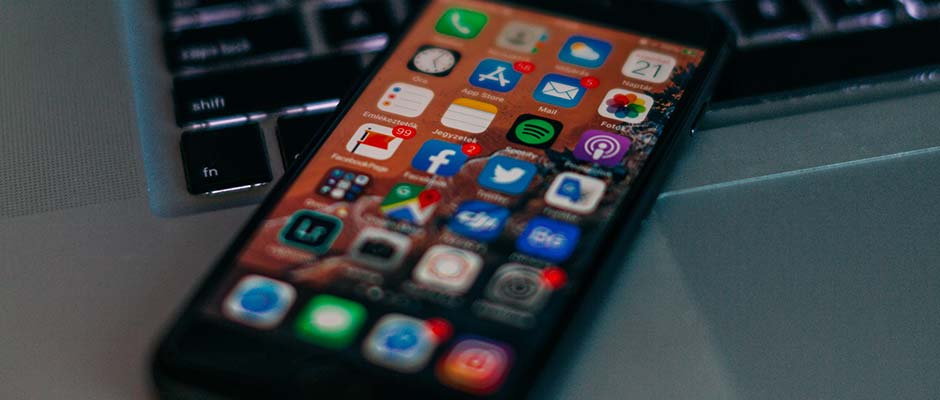Our culture worships efficiency as the high mark of civilization. We bemoan any Amazon order that doesn’t hit our porch within twenty-four hours. We exhort Netflix to post an entire series at a time, so we can binge watch without having to wait a week (the horror!) between episodes. We instruct our music apps to play the exact song we want at the exact moment we want to hear it. We decline to drive when we can DoorDash our dinner. And of course, we absolutely must have the latest iPhone with the swiftest chip, connected to an internet connection so fast we can check our email tomorrow.

Technology is Designed to Steal Your Attention
Our technology is built on algorithms designed to cause your thumb to continually scroll, scanning for something interesting to appear on the tiny screen that demarcates your horizon. Over time, the devices rewire our brains, removing our ability to focus on anything for a significant time. TikTok, arguably the most popular social app right now, limits the run time of any video to one minute, a decision not made by chance.
The pitch that arrived in my inbox promised that I could absorb an entire nonfiction book without having to read each page. All I had to do is read their TL;DR (too long; didn’t read) summary or have Siri read it to me. But acquiring the gist of a book is not the same thing as reading it, nor is a summary the only reason you might read a book.

TL;DR Delivers Less Value
My current read is Napoleon: A Life by Andrew Roberts. The book weighs in at more than a thousand pages, even before the extensive notes and index. It's a challenging read because there are so many different Generals that you can lose track of who’s who, but Napoleon led a challenging life. Thankfully, Roberts didn't produce a TL;DR version. Sure, I could just read the Wikipedia entry on Napoleon, but that would deprive me of Roberts’ masterful storytelling, not to mention the insightful lessons from his subject’s success and failure.
Thomas Paine wrote, “What we obtain too cheap, we esteem too lightly: it is dearness only gives everything its value."
I might tweak that to read: "the things we obtain too quickly we esteem too lightly; it is anticipation that gives some things their value."

Eat & Get Out!
Recently, one of my favorite restaurants has tried to turn their tables faster and rush more people through their meals. They want to increase their profit, an understandable goal since they had to close for months during the pandemic. But executing their new plan resulted in an experience where your food arrives at your table within four minutes of sitting down. There are several reasons one might go to a restaurant for dinner that have nothing to do with the food, notably the chance to enjoy the experience and spend time with one’s companions. You may not find it valuable to speed through dinner.
In my first year in an executive development program at Harvard Business School, there was a Starbucks stand outside of the classrooms, allowing you to get coffee before class. But one day, the Starbucks disappeared and was replaced by a small K-cup machine with little cups that delivered something that, as Douglas Adams might put it, was almost, but not quite, entirely unlike coffee. When my professor asked what I thought of the faster, cheaper coffee, I suggested they replace it with actual coffee. Alas, efficiency won out, and these so-called coffeemakers are now everywhere.
In middle school, the nondescript clock hanging on the wall behind the teacher's desk seemed to tick off one minute every century. Time moved slowly, the anticipation growing as the hands found their way to three o'clock—releasing the anticipation, ending our daily sentence, and returning us our freedom. If the days seem to go faster now, it's because we speed through everything. In the business world, we have stand-up meetings because there is no time to work on the business when everything must be done immediately, if not sooner. There is no time and appetite to improve our work by slowing it down and getting it right.
Important, Not Urgent
Stephen Covey recommended using the Eisenhower Matrix to think about the work we should prioritize. The second quadrant, titled "Important, Not Urgent," was the best quadrant, mostly because doing the work there saved you from living in the first quadrant, where everything was "Urgent and Important." Unless your office is literally a trauma center, occupying that quadrant often means you are not doing the important and non-urgent work that produces better and lasting results.
You do not have to run the Red Bull rat race, even if everyone around you is hurried and harried. Don't speed through life, zipping from this thing to that, never giving yourself over to something long enough to enjoy what you are doing or improve the quality of your work and your life. Wise people have long recognized the difference between being lazy and being introspective. They find value in stillness, in doing nothing, and in taking their time.
You are here for around 4,000 weeks, weeks that fly by faster every year. There is no reason to sprint through them. If you do good work, time will improve the quality of your results—not to mention your experience.








.jpg?width=768&height=994&name=maximize-productivity-ebook-v3-1-cover%20(2).jpg)


